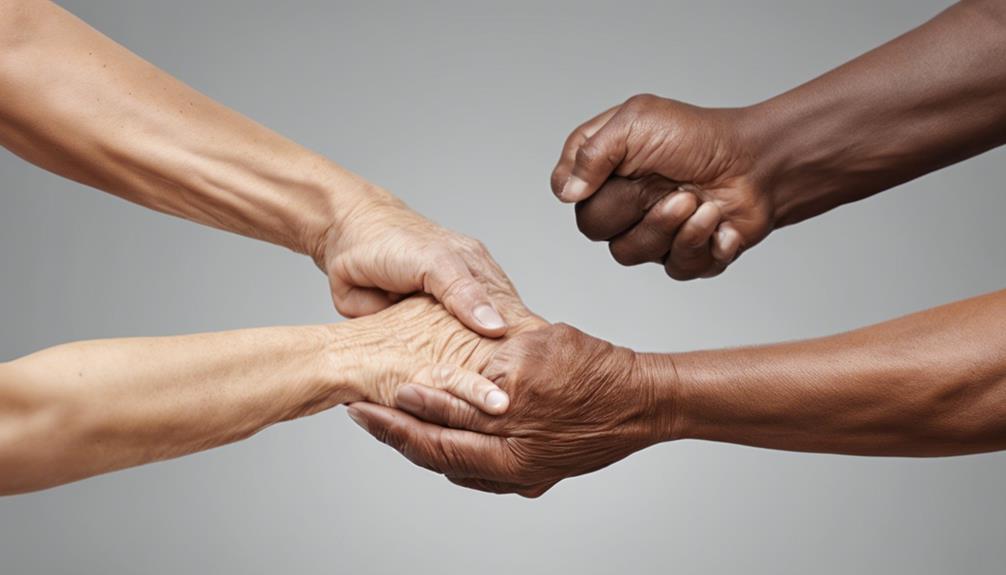As caregivers, we know how challenging it can be to carve out time for stress relief among all of life’s demands.
However, what if we told you that implementing simple yet effective strategies could make a significant difference in your well-being and the quality of care you provide?
Let's explore practical techniques and tips that can help caregivers and eldercare givers manage stress, prevent burnout, and ultimately lead to a healthier and more balanced caregiving experience.
Key Takeaways
- Embrace mindfulness practices for self-care.
- Seek support from communities and loved ones.
- Delegate tasks and take regular breaks.
- Utilize respite care options for stress relief.
Mindfulness Techniques for Caregiver Stress Relief
Incorporating mindfulness techniques into daily routines is essential for caregivers seeking relief from stress and reclaiming a sense of control over their lives. Caregivers often bear the weight of immense responsibility, which can lead to heightened stress levels and impact their overall health. By embracing mindfulness and meditation practices, caregivers can find solace in moments of quiet stillness, allowing them to live more fully in the present without being burdened by past anxieties or future worries.
Supporting caregivers in integrating mindfulness into their daily routines can greatly help alleviate the pressures they face. These practices enable caregivers to cultivate a more positive mindset and approach their caregiving duties with increased resilience and compassion. By prioritizing self-care through mindfulness, caregivers can enhance their well-being and better manage the demands of their role. Technology may present challenges, but with dedication and support, caregivers can navigate these obstacles and find peace through mindfulness practices.
Self-Care Tips for Caregivers

To effectively support caregivers in maintaining their physical and mental well-being, prioritizing self-care through established routines is paramount. As caregivers, it's crucial to recognize the signs of caregiver stress and take proactive steps to address it.
Incorporating stress relief tips into your daily routine can make a significant difference in your mental health and overall well-being. Engaging in self-care activities such as exercise, meditation, or pursuing hobbies can help reduce stress levels and prevent burnout.
Additionally, joining a support group can provide you with a valuable network of individuals who understand your challenges and can offer guidance and encouragement. Don't underestimate the importance of respite care; taking breaks isn't a luxury but a necessity to recharge and refocus.
Recognizing and Managing Caregiver Burnout
Recognizing and managing caregiver burnout involves understanding the signs of emotional, mental, and physical exhaustion resulting from prolonged stress and responsibilities. It's crucial to prioritize self-care to prevent burnout and maintain overall well-being while caring for a loved one.
Here are some essential points to consider:
- Seeking Support: Joining support groups or reaching out to local resources can provide emotional and practical assistance.
- Sharing Responsibilities: Don't be afraid to delegate tasks and share caregiving duties with others to prevent overwhelming yourself.
- Taking Breaks: It's essential to schedule regular breaks to rest and recharge, allowing you to better care for both your loved one and yourself.
- Recognizing When You Need Help: Acknowledge when the responsibilities become too much to handle alone and be willing to seek professional assistance.
Practical Strategies for Eldercare Stress Relief

Navigating the challenges of caring for elderly loved ones can be both rewarding and demanding. When it comes to practical strategies for eldercare stress relief, incorporating mindfulness techniques and utilizing respite care options can make a significant difference in managing the demands of caregiving. Practicing mindfulness daily can provide a sense of control and empowerment, helping caregivers navigate their responsibilities with a clear mind. Additionally, taking advantage of respite care services allows caregivers to recharge and prevent burnout, ensuring they can continue to provide quality care for their loved ones. Family caregivers can also find relief by staying connected with others who understand their journey and sharing their experiences. Morning solitude and reflection can serve as a rejuvenating practice, offering a moment of peace before the day's responsibilities begin.
| Strategies for Eldercare Stress Relief | ||
|---|---|---|
| 1. Practice daily mindfulness techniques | 2. Utilize respite care options | 3. Stay connected with others |
| 4. Share experiences with fellow caregivers | 5. Engage in morning solitude and reflection |
Building a Support System for Caregiver Well-Being
Establishing a robust support network is crucial for enhancing caregiver well-being and promoting self-care practices. As caregivers, we understand the challenges and emotional toll that come with caring for others. To build a strong support system, consider the following:
- Caregiver Support: Joining local support groups can provide a safe space to share experiences, receive emotional support, and access valuable resources.
- Online Communities: Engaging with online caregiver communities offers a sense of belonging and understanding, connecting you with individuals who are going through similar experiences.
- Family Assistance: Seeking help from family members and friends can lighten the caregiving load and allow you to take breaks to focus on your well-being.
- Professional Services: Utilizing professional services such as respite care or counseling can offer additional support and guidance tailored to your needs.
Frequently Asked Questions
How Caregivers Can Cope With Stress?
When dealing with stress, it's essential to recognize our limits and seek support from others. Taking breaks, practicing mindfulness, and engaging in self-care activities are vital for managing stress effectively. Connecting with local resources and support groups can also provide valuable assistance.
What Is Caregiver Anxiety?
Caregiver anxiety can be overwhelming. It's a constant worry about our loved one's well-being, leading to physical symptoms like headaches and fatigue. This anxiety can make us feel isolated and helpless.
Seeking support and practicing self-care are vital. It's crucial to manage stress to maintain our mental health. Remember, it's okay to ask for help and take care of ourselves too.
What Is the Hardest Part of Being a Caregiver?
Balancing caregiving responsibilities with personal life can be challenging. Witnessing a loved one's health decline is emotionally taxing.
Managing the financial aspects of caregiving adds stress. Dealing with conflicting emotions of guilt and duty towards the care recipient is tough.
Coping with the uncertainty of the future and constant worry about the care recipient's well-being takes a toll. These challenges can make being a caregiver one of the hardest roles we take on.
What Mental Health Conditions Do Caregivers Have?
Mental health conditions commonly experienced by caregivers include depression, anxiety, and burnout. These challenges stem from the immense stress and emotional toll of caregiving.
Neglecting our own mental health needs while caring for others can lead to feelings of isolation and overwhelm. Seeking support and practicing self-care are vital in managing these conditions.
It's crucial for caregivers to prioritize their mental well-being to ensure they can continue providing care effectively.
Conclusion
As caregivers and eldercare givers, we're the pillars of strength for our loved ones, but it's crucial to remember to take care of ourselves too.
Just as a lighthouse guides ships safely to shore, mindfulness practices and self-care tips can help us navigate the stormy seas of stress and burnout.
Let's prioritize our well-being, build a support system, and shine brightly in the darkness, knowing that we aren't alone in this journey.









